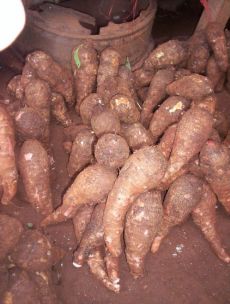Cocoyam, or Taro or dasheen corm possesses more calories than potatoes. 100 grams of root provides 112 calories. Their calorie value chiefly comes from complex carbohydrates, amylose and amylopectin.
Nonetheless, the roots are very low in fats and protein than in cereals and pulses. Their protein levels can be comparable to that of other tropical food sources like yam, cassava, potato, plantain etc.
Cocoyams are free from gluten protein. They carry high-quality phyto-nutrition profile comprising of dietary fiber, and antioxidants in addition to moderate proportions of minerals and vitamins.
It is one of the finest sources of dietary fibres; 100g flesh provides 4.1g or 11 percent of daily-requirement of dietary fiber. Together with slow digesting complex carbohydrates, moderate amounts of fiber in the food help gradual rise in blood sugar levels.
Yellow-fleshed roots and young, tender leaves have significant levels of phenolic flavonoid pigment antioxidants such as B-carotenes, and cryptoxanthin along with vitamin A. 100g fresh taro leaves provide 4825 IU or 161 percent of RDA of vitamin A. altogether, these compounds are required for maintaining healthy mucus membranes, skin and vision. Consumption of natural foods rich in flavonoid helps protect from lung and oral cavity cancers.
It also contains good levels of some of the valuable B-complex group of vitamins such as pyridoxine (vitamin B-6), folates, riboflavin, pantothenic acid and thiamine.
Further, the corms provide healthy amounts of some of important minerals like zinc, magnesium, copper, iron, and manganese. In addition the root has very good amounts of potassium. Potassium is an important component of cell and body fluids that help regulate heart rate and blood pressure.












